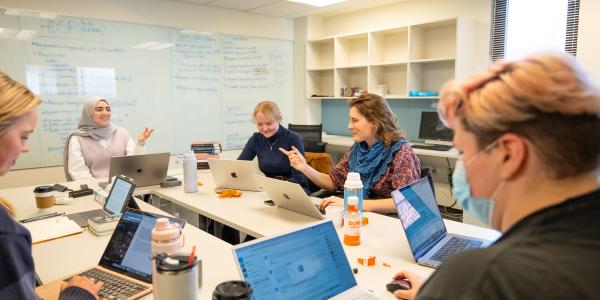On Oct. 13, the Transdisciplinary Institute in Applied Data Sciences (TRIADS) will present a day of data visualization workshops and presentations, highlighting the growing importance of visual storytelling for researchers.
As a researcher specializing in personality psychology, WashU alumna Emorie D. Beck, PhD ’20, works with data that contains all the richness and complexity of the human condition.

Beck, an assistant professor of psychology at the University of California, Davis, often synthesizes research spanning thousands of people and multiple decades. But she works to never lose sight of the individuals at the heart of her work.
“My research has challenged me to think very carefully about how to share this information,” Beck said. “It’s really important to the individuals in these studies because they themselves are the subjects. On the other hand, I feel an intense sense of responsibility to this research because it has public health and policy relevance, linking personality traits to long-term health outcomes.”
When it comes to telling the story of her research, data visualization has proven to be one of the most useful tools at Beck’s disposal. Whether it’s depicting the change in an individual’s personality over time or aggregating thousands of subjects into one graphical overview, the visual aspects of Beck’s work are essential to communicating its importance.
“When I have a new grant that I’m working on, I will often spend a week just making the visualizations for it,” Beck said. “If a reviewer is going to spend some time on my application, I always try to include an overview figure that’s going to say, ‘These are the aims, this is how we’re going to test them, and this is why this is cool.’”
As part of Data Visualization Day on Oct. 13, Beck will share her approach during a two-session workshop, followed by a research talk focused on the challenges of predicting human behavior. Both events are presented by the Transdisciplinary Institute in Applied Data Sciences (TRIADS), which will also host a Python data visualization workshop on Oct. 13 as part of its ongoing TRIADS Training Series.
TRIADS is a signature initiative of the Arts & Sciences Strategic Plan. Through its Training Series, seed grant program, and invited speaker series, TRIADS seeks to leverage the latest tools in data science to address pressing societal issues.TRIADS co-director Tammy English said the Data Visualization Day programming underscores the rising importance of data storytelling at a time when securing external funding has grown increasingly challenging and competitive.
“People are having to become more flexible in the places that they go to for funding,” English said. “Effective visual storytelling can help to set a project apart.”
Beck is excited to return to her alma mater to pass on what she’s learned since she earned her doctorate. She teaches a data visualization course at UC Davis that sees enthusiastic student participation.
“I think what students really like is that, relative to typical programming, data visualization feels less scary,” Beck said. “When students can actually produce something tangible that they can see right in front of them, they’re a lot more willing to experiment with different kinds of code and are not so afraid to ‘break’ something.”
While data visualization is built on a foundation of quality research and programming, it’s the design elements that truly make or break a visualization as a piece of communication.
“There’s a strong scientific tendency to make data visualizations that are overly complicated and therefore functionally communicate nothing to most people,” Beck said. “So, there are small things that most of us can do to remove some of those barriers and make sure that everyone from a PhD student to my mom can look at a graph and know what we’re trying to communicate.”
Here is the full schedule for TRIADS’ Data Visualization Day on Monday, October 13. Click the links below to RSVP for individual sessions:
- 8:30 – 11:30 a.m.: Morning session of “Storytelling with Data in R and ggplot2” workshop, featuring Emorie D. Beck. Hosted in the TRIADS Collaborative Space, 420 Jolley Hall.
- 11:30 a.m. – 1 p.m.: First session of TRIADS Training Series workshop on “Data Visualization with Python.” Hosted in Olin Library, Instruction Room 3.
- 1 – 3 p.m.: Afternoon session of “Storytelling with Data in R and ggplot2” workshop. Hosted in the TRIADS Collaborative Space, 420 Jolley Hall.
- 3:30 p.m.: Research talk by Beck: “Promises and Challenges of Prediction in Psychology.” Hosted in the Women’s Building Formal Lounge.
- 4:30 – 6 p.m.: Data visualization showcase and reception with hors d'oeuvres and networking. Hosted in the Women’s Building Formal Lounge.
In addition, TRIADS will host a coffee hour on data visualization from 2 to 3 p.m. on Thursday, Oct. 30 in 420 Jolley Hall.





